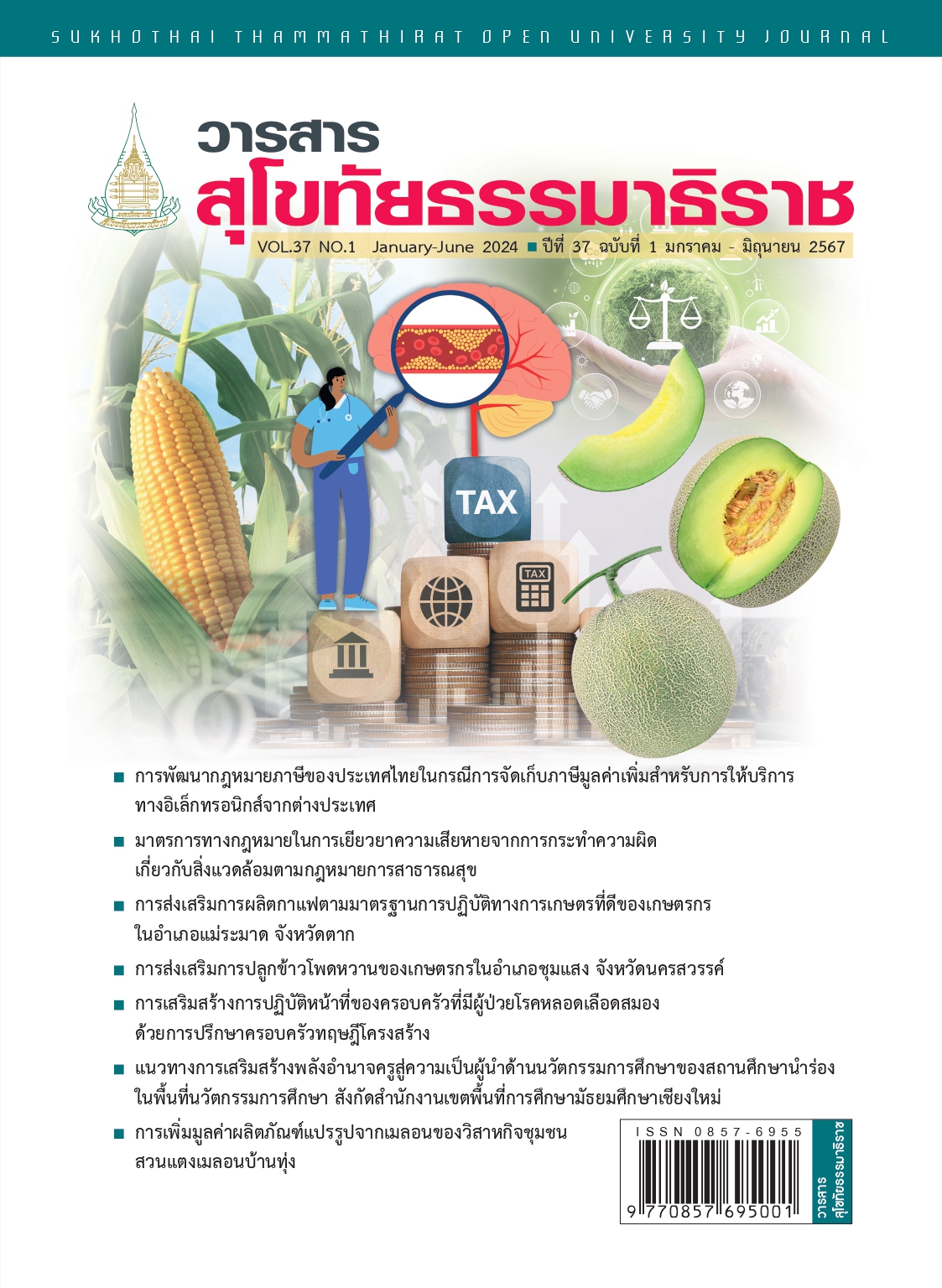มาตรการทางกฎหมายในการเยียวยาความเสียหาย จากการกระทำความผิดเกี่ยวกับสิ่งแวดล้อม ตามกฎหมายการสาธารณสุข
คำสำคัญ:
มาตรการทางกฎหมาย, เยียวยาความเสียหาย, สิ่งแวดล้อม, ความผิดเกี่ยวกับสิ่งแวดล้อม, การสาธารณสุขบทคัดย่อ
การศึกษาค้นคว้าอิสระนี้มีวัตถุประสงค์เพื่อ (1) ศึกษาแนวคิด ทฤษฎีและหลักการเกี่ยวกับการเยียวยาผู้เสียหายจากการกระทำความผิดเกี่ยวกับสิ่งแวดล้อม (2) ศึกษามาตรการทางกฎหมายเกี่ยวกับการเยียวยาผู้เสียหายจากการกระทำความผิดเกี่ยวกับสิ่งแวดล้อมในสหรัฐอเมริกา ประเทศญี่ปุ่น และประเทศไทย (3) วิเคราะห์เปรียบเทียบมาตรการทางกฎหมายเกี่ยวกับการเยียวยาผู้เสียหายจากการกระทำความผิดเกี่ยวกับสิ่งแวดล้อมในสหรัฐอเมริกา ประเทศญี่ปุ่น และประเทศไทย (4) เสนอแนวทางที่เหมาะสมในการกำหนดมาตรการเกี่ยวกับการเยียวยาผู้ได้รับความเสียหายจากการกระทำความผิดเกี่ยวกับสิ่งแวดล้อมตามกฎหมายการสาธารณสุข ที่เหมาะสมกับประเทศไทย จากการศึกษาพบว่า (1) การนำแนวคิดเกี่ยวกับการพิจารณาการเจ็บป่วย
และการเยียวยาสำหรับการได้รับสารพิษแต่ยังไม่ปรากฏอาการ และหลักผู้ก่อมลพิษเป็นผู้จ่าย มาปรับใช้ ถือเป็นพื้นฐานสำคัญสำหรับการกำหนดมาตรการเยียวยาผู้เสียหายจากการกระทำความผิดเกี่ยวกับสิ่งแวดล้อม (2) กฎหมายของสหรัฐอเมริกาและญี่ปุ่นกำหนดมาตรการเยียวยาความเสียหายจากการกระทำผิดเกี่ยวกับสิ่งแวดล้อมโดยการจัดตั้งกองทุนเยียวยา ส่วนกฎหมายการสาธารณสุขของประเทศไทยกำหนดมาตรการลงโทษในทางอาญา
และมาตรการทางปกครอง เพื่อป้องปรามมิให้มีการกระทำความผิด (3) มาตรการเยียวยาความเสียหายจากการกระทำผิดเกี่ยวกับสิ่งแวดล้อมของสหรัฐอเมริกาและญี่ปุ่นแม้จะมีการจัดตั้งกองทุนเหมือนกัน แต่มีจุดมุ่งหมายต่างกัน กล่าวคือ สหรัฐอเมริกามุ่งเน้นการเยียวยาฟื้นฟูสิ่งแวดล้อม ส่วนญี่ปุ่นมุ่งเน้นเยียวยาบุคคลผู้ได้รับความเสียหาย ขณะที่กฎหมายการสาธารณสุขของประเทศไทยไม่มีมาตรการเยียวยาความเสียหายแก่ผู้ได้รับความเสียหาย
(4) จึงควรแก้ไขเพิ่มเติมบทบัญญัติกฎหมายการสาธารณสุขของไทย ให้มีหมวดว่าด้วยกองทุนเยียวยาความเสียหาย เพื่อจ่ายค่าชดเชยแก่ผู้ได้รับความเสียหายต่อชีวิต ร่างกาย สุขภาพและอนามัย จากการกระทำความผิดเกี่ยวกับสิ่งแวดล้อมตามกฎหมายว่าด้วยการสาธารณสุขโดยผู้เสียหายจะได้รับการพิจารณาสิทธิและจ่ายค่าชดเชยจากกองทุนโดยไม่ต้องนำคดีขึ้นสู่การพิจารณาของศาล ส่งผลให้ผู้ที่ได้รับความเสียหายได้รับการเยียวยาอย่างทันท่วงที
เอกสารอ้างอิง
Armeen, S. (2013). Environmental Litigation in the Judiciary. Training Manual for Environmental Lawyers, 5th Edition.
Bureau of Environmental Health, Department of Health, Ministry of Public Health. (2017). Guide to Community Environmental Health Management for the Public. Bangkok: Mahachulalongkornrajavidyalaya University Press.
Chaianong, L. (2007). Environmental Case Adjudication: Experiences from Japanese Courts. Yutithamparitat Journal, 1(5).
EPA United States Environmental Protection Agency. from Summary of the Comprehensive Environmental Response, Compensation, and Liability Act (Superfund) | US EPA.
Ferrara v. Galluchio (5 NY2d 16, 152 N.E.2d 249, 176 N.Y.S.2d 996 [1958]) from https://www.leagle.com/decision/1958215ny2d16120
Irving J. Sloan. (1971). Environment and the Law.
Katikan, K. (1990). Measures for Claiming Damages in Environmental Cases. Teaching Materials for Environmental Law Course (Unit 14, p. 343). (5th ed.). Bangkok: Sukhothai Thammathirat Open University Press.
Klaisuban, P. (2007). Concepts, Theories, and Legal Principles Related to Environmental Cases. Administrative Court Journal.
Leenapesanan, P. (2007). Environmental Case Adjudication in Japan. Yutithamparitat Journal,1(6).
Maolanond, P. Teaching Materials for Environmental Law Course, Unit 1: The Role of Law in Controlling and Organizing the Environment. Retrieved September 14, 2020, from https://dl.parliament.go.th/handle/lirt/460685
Mullikamal, S. (1989). Compensation for Damage from Industrial Pollution. Law Journal, 13(1).
Mullikamal, S. (1997). Product Liability Law in Japan. Bot Bundit Journal.
Mullikamal, S. (1999). Environmental Law Enforcement. Bangkok: Nititham.
Nimmanahaeminda, K. (1992). Environmental Law. Bangkok: Faculty of Law, Chulalongkorn University.
Phara, S. (2007). Natural Resources and Environment. Bangkok: Exper Net.
Phrompan, V. (2002). Recedure of Civil Environmental Case on the Public Resources by State Attorney. Master Thesis, LL.M., Ramkhamhaeng University.
Rayanakorn, K. (2006). Development of Environmental Law Principles and Community Rights. Academic Paper No. 25 (pp. 16-21). Public Participation Project in Drafting Natural Resources and Environmental Plans. Chiang Mai: Social Research Institute, Chiang Mai University
Ruangsri, W. (2009). Environmental Valuation: Experiences from the U.S. Courts. In Proceedings of the Academic Seminar on New Approaches to Developing Environmental Justice Processes. Rabi Badhanasakti Research and Development Institute, Off ice of the Judiciary.
Salyapong, J. (1982). Forms of Environmental Law. Master Thesis, LL.M, Chulalongkorn University.
Sinthipong, U. (2004). Environmental Law. Bangkok: Winuchon press.
Sotthibandhu, S. (2007). Commentary on Torts, Management of Affairs without Mandates and Undue Enrichment. Bangkok: Winyuchon Press.
Supanit, S. (1994). Commentary on Civil and Commercial Code: Tort Law. Bangkok: Sawang Sutthi Printing.
Thailand Population Statistics Report. Retrieved June 17, 2020, from https://www.worldometers. info/world-population/thailand-population/
Vannasaeng, P. (2012). The Role of the Court of Justice and Environmental Law. Retrieved October 2, 2020, from http://www.dlo.co.th/node/252
Wongbandit, A. (1986). Shifting the Burden of Proof to Address Def iciencies in Common Law in Toxic Environmental Cases in Canada. Thammasat Law Journal, 16(3), 166.
World Population Statistics Report. Retrieved June 17, 2020, from https://www.worldometers.info/world-population/#ref-1
ดาวน์โหลด
เผยแพร่แล้ว
เวอร์ชัน
- 2024-09-17 (2)
- 2024-09-17 (1)
รูปแบบการอ้างอิง
ฉบับ
ประเภทบทความ
สัญญาอนุญาต
ลิขสิทธิ์ (c) 2024 มหาวิทยาลัยสุโขทัยธรรมาธิราช

อนุญาตภายใต้เงื่อนไข Creative Commons Attribution-NonCommercial-NoDerivatives 4.0 International License.
บทความที่ได้รับการตีพิมพ์เป็นลิขสิทธิ์ของวารสารมหาวิทยาลัยสุโขทัยธรรมาธิราช
ข้อความที่ปรากฏในบทความแต่ละเรื่องในวารสารวิชาการเล่มนี้เป็นความคิดเห็นส่วนตัวของผู้เขียนแต่ละท่านไม่เกี่ยวข้องกับมหาวิทยาลัยสุโขทัยธรรมาธิราช และคณาจารย์ท่านอื่นๆในมหาวิทยาลัยฯ แต่อย่างใด ความรับผิดชอบองค์ประกอบทั้งหมดของบทความแต่ละเรื่องเป็นของผู้เขียนแต่ละท่าน หากมีความผิดพลาดใดๆ ผู้เขียนแต่ละท่านจะรับผิดชอบบทความของตนเองแต่ผู้เดียว
ห้ามนำข้อความทั้งหมด หรือบางส่วนไปพิมพ์ซ้ำ เว้นแต่จะได้รับอนุญาตจากกองบรรณาธิการวารสาร



